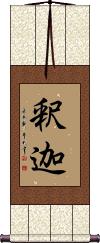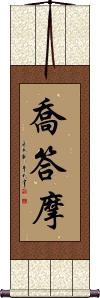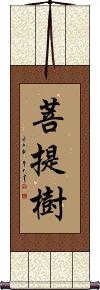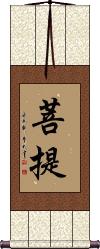Many custom options...
And formats...

Siddhartha in Chinese / Japanese...
Buy a Siddhartha calligraphy wall scroll here!
Personalize your custom “Siddhartha” project by clicking the button next to your favorite “Siddhartha” title below...
1. Siddhartha
3. Gautama
4. The Tree of Enlightenment / The Bodhi Tree
Siddhartha
悉達多 is the name Siddhartha (as in Siddhartha Gautama), the personal name for Śākyamuni.
This same Buddha is also known as “Shakyamuni Gautama,” “Gotama Buddha,” or “Tathagata.”
Siddhartha Gautama was a spiritual teacher in the northern region of the Indian subcontinent who founded Buddhism. He is generally seen by Buddhists as the Supreme Buddha (Sammāsambuddha) of known human history.
The actual meaning of this name in Chinese is the realization of all aims, or simply being prosperous.
This name is sometimes romanized from the original Sanskrit or Pali as Siddhattha (from Siddhattha Gotama), Siddharth, Siddhārtha, or Sarvāthasiddha.
Siddhārtha or Sarvāthasiddha can also be written as 悉達, 悉多, 悉多頞他, or 悉陀.
Shakyamuni / The Buddha
釈迦 is the way to write Shakyamuni in Japanese.
It's just two Kanji, the first is a simplified version of the one used in Chinese for Shakyamuni, and the second one is identical to the Chinese.
This refers to the Buddha (Siddhartha Gautama, 563 BCE-483 BCE) also known as Sakyamuni and Gautama Buddha.
This has a very good meaning in Japanese but is an odd selection for a wall scroll. It appears here more for reference.
Gautama
The Tree of Enlightenment / The Bodhi Tree
菩提樹 is the full title of the Bodhi tree (a fig tree) under which Siddhartha Gautama (the legendary man who established the Buddhist religion), achieved enlightenment.
Sometimes this is referred to as “the tree of enlightenment.” If you don't have a Bodhi tree to sit under, maybe you can achieve enlightenment under a wall scroll with this title.
Bodhi - Awakening Enlightenment
The Bodhi or 菩提 is the moment of completion in Buddhism.
It is when all things become known and you have completed your journey to enlightenment.
The reference is to the Bodhi tree where Siddhartha Gautama (the legendary man who established the Buddhist religion) achieved enlightenment. Sometimes this is referred to as “the tree of enlightenment,” but if you want the full version with the character for a tree at the end, please see the Bodhi Tree entry.
See Also: Buddhism | Buddha | Nirvana | Enlightenment
Shakyamuni / The Buddha
釋迦牟尼 is a transliteration of “Shakyamuni” or “Sakyamuni” in Chinese, Japanese, and old Korean.
The perceived meaning of the name is roughly translated as “Sage of the Sakyas.”
This same Buddha is also known as “Siddhartha Gautama,” “Gotama Buddha,” “Tathagata,” or simply, “The Supreme Buddha.”
Shakyamuni is the legendary man and prince who eventually established the Buddhist religion.
Note: Occasionally Romanized as “Siddhattha Gotama.”
This combination of characters is sometimes seen and used in South Korea and Japan as well (with the same meaning).
Note: 釋迦牟尼 came from the Sanskrit शाक्यमुनि and can also be romanized with diuretics as Śākyamuni.
Not the results for siddhartha that you were looking for?
Below are some entries from our dictionary that may match your siddhartha search...
| Characters If shown, 2nd row is Simp. Chinese |
Pronunciation Romanization |
Simple Dictionary Definition |
喬答摩 乔答摩 see styles |
qiáo dā mó qiao2 da1 mo2 ch`iao ta mo chiao ta mo Kōtōma |
More info & calligraphy: GautamaGautama |
悉達多 悉达多 see styles |
xī dá duō xi1 da2 duo1 hsi ta to shiddaruta しっだるた |
More info & calligraphy: Siddhartha(personal name) Shiddaruta (悉達) Siddhārtha, Sarvāthasiddha, also悉多 (悉多頞他); 悉陀 the realization of all aims, prosperous; personal name of Śākyamuni. |
釋迦牟尼 释迦牟尼 see styles |
shì jiā móu ní shi4 jia1 mou2 ni2 shih chia mou ni Shakamuni |
More info & calligraphy: Shakyamuni / The Buddha釋迦文 (釋迦文尼); 釋伽文 Śākyamuni, the saint of the Śākya tribe. muni is saint, holy man, sage, ascetic monk; it is: intp. as 仁 benevolent, charitable, kind, also as 寂默 one who dwells in seclusion. After '500 or 550' previous incarnations, Śākyamuni finally attained to the state of Bodhisattva, was born in the Tuṣita heaven, and descended as a white elephant, through her right side, into the womb of the immaculate Māyā, the purest woman on earth; this was on the 8th day of the 4th month; next year on the 8th day of the 2nd month he was born from her right side painlessly as she stood under a tree in the Lumbinī garden. For the subsequent miraculous events v. Eitel. also the 神通遊戲經 (Lalitavistara), the 釋迦如來成道記, etc. Simpler statements say that he was born the son of Śuddhodana, of the kṣatriya caste, ruler of Kapilavastu, and Māyā his wife; that Māyā died seven days later, leaving him to be brought up by her sister Prājapati; that in due course he was married to Yaśodharā who bore him a son, Rāhula; that in search of truth he left home, became an ascetic, severely disciplined himself, and finally at 35 years of age, under a tree, realized that the way of release from the chain of rebirth and death lay not in asceticism but in moral purity; this he explained first in his four dogmas, v. 四諦 and eightfold noble way 八正道, later amplified and developed in many sermons. He founded his community on the basis of poverty, chastity, and insight or meditation, ad it became known as Buddhism, as he became known as Buddha, the enlightened. His death was probably in or near 487 B.C., a few years before that of Confucius in 479. The sacerdotal name of his family is Gautama, said to be the original name of the whole clan, Śākya being that of his branch, v. 瞿, 喬.; his personal name was Siddhārtha, or Sarvārthasiddha, v. 悉. |
佛陀 see styles |
fó tuó fo2 tuo2 fo t`o fo to budda |
Buddha (a person who has attained Buddhahood, or specifically Siddhartha Gautama) v. 佛 There are numerous monks from India and Central Asia bearing this as part of their names. |
悉多 see styles |
xī duō xi1 duo1 hsi to Shitta |
Siddhārtha |
悉達 悉达 see styles |
xī dá xi1 da2 hsi ta Shitta |
Siddhārtha |
檀特 see styles |
tán tè tan2 te4 t`an t`e tan te dandoku だんどく |
(surname) Dandoku 檀陀; 彈多落迦 Dantaloka, a mountain 'near Varucha', with a cavern (now called Kashmiri-Ghār) where Sudāna (cf. 須) lived, or as some say the place where Śākyamuni, when Siddhārtha, underwent his ascetic sufferings. |
瞿曇 瞿昙 see styles |
qú tán qu2 tan2 ch`ü t`an chü tan kudon くどん |
Gautama, surname of the Siddhartha, the historical Buddha (person) Gautama (the family name of Buddha) Gautama, the surname of Buddha's family; hence a name of Śākyamuni. Also 倶譚 or 具譚 later 喬答摩 q.v. |
釋宮 释宫 see styles |
shì gōng shi4 gong1 shih kung shakugku |
The Śākya palace, from which prince Siddhārtha went forth to become Buddha. |
天中天 see styles |
tiān zhōng tiān tian1 zhong1 tian1 t`ien chung t`ien tien chung tien tenchū ten |
devaatideva: deva of devas. The name given to Siddhartha (i. e. Śākyamuni) when, on his presentation in the temple of 天王 Maheśvara (Siva), the statues of all the gods prostrated themselves before him. |
羅ご羅 see styles |
ragora らごら |
(kana only) Rahula (son of Siddhartha Gautama) |
藍毗尼 蓝毗尼 see styles |
lán pí ní lan2 pi2 ni2 lan p`i ni lan pi ni |
Lumbini, Nepal, birthplace of Siddhartha Gautama 釋迦牟尼|释迦牟尼[Shi4 jia1 mou2 ni2] founder of Buddhism (also written 嵐毘尼|岚毗尼[Lan2 pi2 ni2], 臘伐尼|腊伐尼[La4 fa2 ni2], 林微尼[Lin2 wei1 ni2]) |
釋迦佛 释迦佛 see styles |
shì jiā fó shi4 jia1 fo2 shih chia fo |
Sakyamuni Buddha (Sanskrit: sage of the Sakya); Siddhartha Gautama (563-485 BC), the historical Buddha and founder of Buddhism |
ラーフラ see styles |
raafura / rafura ラーフラ |
(kana only) Rahula (son of Siddhartha Gautama) |
ラゴーラ see styles |
ragoora ラゴーラ |
(kana only) Rahula (son of Siddhartha Gautama) |
一切義成 一切义成 see styles |
yī qiè yì chéng yi1 qie4 yi4 cheng2 i ch`ieh i ch`eng i chieh i cheng Issai gijō |
Sarvārthasiddha, or Siddhārtha; all wishes realized, name given to Śākyamuni at his birth; v. 悉, 薩. |
悉多太子 see styles |
xī duō tài zǐ xi1 duo1 tai4 zi3 hsi to t`ai tzu hsi to tai tzu Shitta taishi |
Prince Siddhārtha |
悉多頞他 see styles |
xī duō è tā xi1 duo1 e4 ta1 hsi to o t`a hsi to o ta Shittaata |
Siddhārtha, see below. |
摩訶摩耶 摩诃摩耶 see styles |
mó hē mó yé mo2 he1 mo2 ye2 mo ho mo yeh mokomaya |
mahāmāyā, intp. by M.W. as 'great deceit or illusion worldly illusion, the divine power of illusion (which makes the material universe appear as if really existing and renders it cognizable by the senses), the Great Illusion (the illusory nature of worldly objects personified and identified with Durgā)'. Mahāmāyā was the wife of Śuddhodana, and mother of Śākyamuni. He, Siddhārtha, was born 'from her right side', and she died seven days later, her sister Mahāprajāpati becoming his foster mother. Also called 摩訶第脾 Mahādevī; 摩訶夫人 Lady Māyā, etc. |
シッダルタ see styles |
shiddaruta シッダルタ |
(surname) Siddhartha |
釋迦牟尼佛 释迦牟尼佛 see styles |
shì jiā móu ní fó shi4 jia1 mou2 ni2 fo2 shih chia mou ni fo Shakamuni butsu |
Sakyamuni Buddha (Sanskrit: sage of the Sakya); Siddhartha Gautama (563-485 BC), the historical Buddha and founder of Buddhism Śākyamuni Buddha |
シッダールタ see styles |
shiddaaruta / shiddaruta シッダールタ |
(surname) Siddhartha |
ゴータマブッダ see styles |
gootamabudda ゴータマブッダ |
(person) Buddha; Siddhartha; Gautama; Gautama Siddhartha; Gautama Buddha |
Variations: |
ragora; raafura; ragoora / ragora; rafura; ragoora らごら; ラーフラ; ラゴーラ |
(kana only) Rāhula (son of Siddhartha Gautama) |
ゴータマ・ブッダ |
gootama budda ゴータマ・ブッダ |
(person) Buddha; Siddhartha; Gautama; Gautama Siddhartha; Gautama Buddha |
The following table may be helpful for those studying Chinese or Japanese...
| Title | Characters | Romaji (Romanized Japanese) | Various forms of Romanized Chinese | |
| Siddhartha | 悉達多 悉达多 | shiddatta / shiddaruta | xī dá duō xi1 da2 duo1 xi da duo xidaduo | hsi ta to hsitato |
| Shakyamuni The Buddha | 釈迦 | sha ka / shaka | shì jiā / shi4 jia1 / shi jia / shijia | shih chia / shihchia |
| Gautama | 喬答摩 乔答摩 | Kou tou ma / Koutouma / Ko to ma | qiáo dā mó qiao2 da1 mo2 qiao da mo qiaodamo | ch`iao ta mo chiaotamo chiao ta mo |
| The Tree of Enlightenment The Bodhi Tree | 菩提樹 菩提树 | bodaiju | pú tí shù pu2 ti2 shu4 pu ti shu putishu | p`u t`i shu putishu pu ti shu |
| Bodhi - Awakening Enlightenment | 菩提 | bodai | pú tí / pu2 ti2 / pu ti / puti | p`u t`i / puti / pu ti |
| Shakyamuni The Buddha | 釋迦牟尼 释迦牟尼 | sha ka mu ni shakamuni | shì jiā móu ní shi4 jia1 mou2 ni2 shi jia mou ni shijiamouni | shih chia mou ni shihchiamouni |
| In some entries above you will see that characters have different versions above and below a line. In these cases, the characters above the line are Traditional Chinese, while the ones below are Simplified Chinese. | ||||
Successful Chinese Character and Japanese Kanji calligraphy searches within the last few hours...









